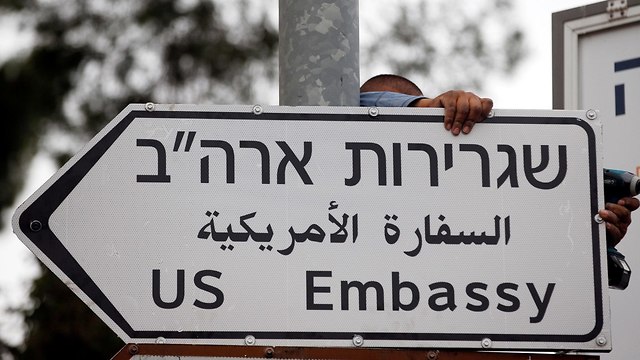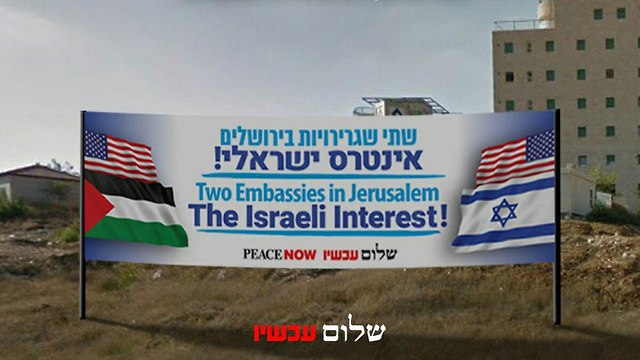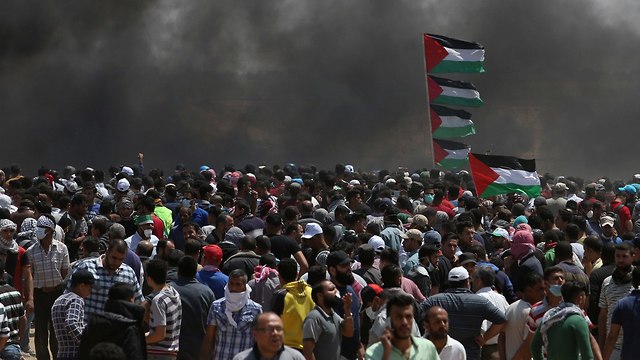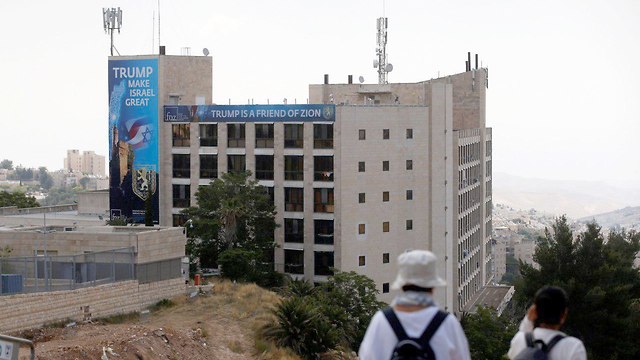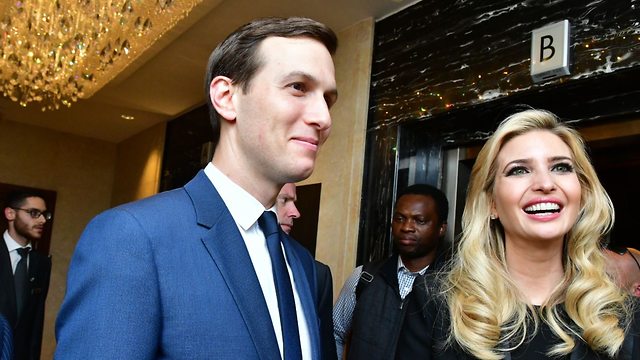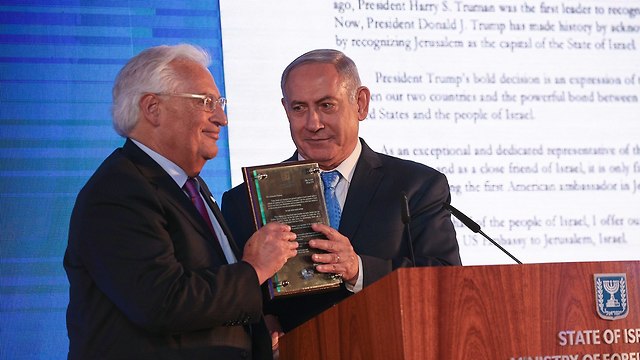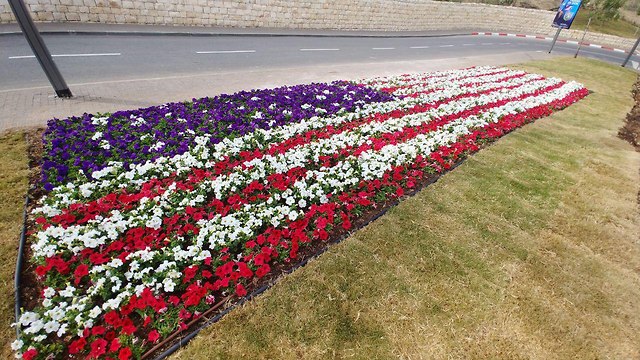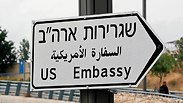
The United States will inaugurate its embassy in Jerusalem on Monday, some five months after US President Donald Trump broke with decades of American foreign policy and recognized the city as Israel's capital.
"A great day for Israel," Trump tweeted early Monday.
The timing of Monday's events was deeply symbolic, both to Israel and the Palestinians.
The US said it chose the date to coincide with the 70th anniversary of Israel's establishment.
But it also marks the anniversary of what Palestinians call their "nakba," or catastrophe, a reference to the exodus of hundreds of thousands who fled or were expelled from what is now Israel during the 1948 war surrounding Israel's independence.
The Palestinians, who want their own future state with its capital in east Jerusalem, have been outraged by Trump's shift from previous administrations' preference for keeping the US Embassy in Tel Aviv pending progress in peace efforts. Those talks have been frozen since 2014.
Palestinian President Mahmoud Abbas cut ties with the Trump administration and declared it unfit to remain in its role as the sole mediator in peace talks.
Saeb Erekat, a senior Abbas aide, blasted the Trump administration Monday, saying Trump had violated a promise to hold off on moving the embassy to give peace talks a chance and that his administration is "based on lies."
Erekat said the Trump administration has "become part of the problem, not part of the solution."
Other major powers worry that the US move could inflame Palestinian unrest in the West Bank and on the Gaza Strip border, where 28 Palestinians have been killed in violent clashes with the IDF.
Violent clashes in Gaza ahead of embassy opening
Monday marked the biggest showdown in recent weeks between the IDF and Gaza's Hamas rulers along the volatile border.
It is the culmination of a campaign, led by the Islamic terrorist Hamas group and fueled by despair among Gaza's 2 million people, to break the decade-old border blockade of the territory by Israel and Egypt.
Hamas leaders have suggested a border breach is possible Monday, while Israel has warned it would prevent protesters from breaking through the barrier at any cost.
In Jerusalem, top Trump administration officials attended events linked to the inauguration of the embassy later Monday.
Speaking at a celebration hosted by the Orthodox Union, Treasury Secretary Steven Mnuchin said that it was a US "national security priority" to move the embassy from Tel Aviv to Jerusalem.
An American delegation to the embassy opening ceremony numbers 250 people, including Congressmen, rabbis and administration officials. It will also include Deputy Secretary of State John Sullivan, Trump's envoy to the Middle East Jason Greenblatt, American Ambassador David Friedman, Florida Governor Rick Scott, Senators Lindsey Graham, Ted Cruz, Mike Lee and Dean Heller, and Congressmen Joe Wilson and Ted Deutch.
The official embassy opening ceremony will kick off at 4 pm Monday with about 800 participants. It will begin with the American anthem and opening remarks from Ambassador Friedman, who will invite a priest and a rabbi to offer their blessings.
The ceremony will include speeches by Netanyahu, Mnuchin and Sullivan, followed by a televised greeting from President Trump. Singer Aveva Dese and her band will perform the songs “Jerusalem of Gold” and “Jerusalem.”
The embassy’s official sign with a dedication plaque for President Trump and Vice President Pence will be unveiled, followed by speeches from President Reuven Rivlin and Kushner.
The embassy’s mezuzah will be affixed by Ambassador Friedman on Wednesday.
At the same time, the Israeli Embassy in Washington will host a special event in honor of the embassy move and Israel’s 70th anniversary. The guest of honor will be Vice President Mike Pence, who will also speak at the event.
'Jerusalem will remain Israeli under any peace deal'
Most countries say Jerusalem's status should be determined in a final peace settlement, and say moving their embassies now would prejudge any such deal.
Addressing dignitaries at the Foreign Ministry during a reception on Sunday, including US Treasury Secretary Steven Mnuchin and the president's daughter and son-in-law, Ivanka Trump and Jared Kushner, Prime Minister Benjamin Netanyahu urged others to follow Washington's lead.
"Move your embassies to Jerusalem because it's the right thing to do," Netanyahu said. "Move your embassies to Jerusalem because it advances peace, and that's because you can't base peace on a foundation of lies."
Netanyahu said that "under any peace agreement you could possibly imagine, Jerusalem will remain Israel's capital."
Jerusalem, which is sacred to Jews, Muslims and Christians, was decorated with roadside flowerbeds in the design of the US flag and posters reading "Trump make Israel great again."
"Tragically, the US administration has chosen to side with Israel's exclusivist claims over a city that has for centuries been sacred to all faiths," the general delegation of the Palestine Liberation Organization to the United States said.
The US Embassy move "gives life to a religious conflict instead of a dignified peace," it said in a statement.
Israel said all 86 countries with diplomatic missions in Israel were invited to the reception gala, and 33 confirmed attendance. Among those present were delegates from Guatemala and Paraguay, which will open their own Jerusalem embassies later this month.
Attending the Foreign Ministry gathering were representatives from Hungary, Romania and the Czech Republic, but none from western European Union states—suggesting a rift within the bloc over Trump's Jerusalem move.
No-show nations withheld comment on Sunday.
The EU mission in Israel tweeted on Friday that the bloc would "respect the international consensus on Jerusalem ... including on the location of their diplomatic representations until the final status of Jerusalem is resolved."
The US Treasury secretary called the embassy relocation "a sign of the enduring friendship and partnership between our two countries" and also referred to the US withdrawal last week from the Iran nuclear deal, a move welcomed by Israel and some US Arab allies in the Gulf but lamented by other world powers.
The Trump administration has sought to keep the door open to Israeli-Palestinian diplomacy by saying the embassy move did not aim to prejudge Jerusalem's final borders. The US consulate in the city, tasked with handling Palestinian ties, will remain.
Washington has not asked Israel to initiate peace moves in exchange for the embassy relocation, US Ambassador David Friedman told reporters on Friday: "There was no give and take with Israel with regard to this decision."















